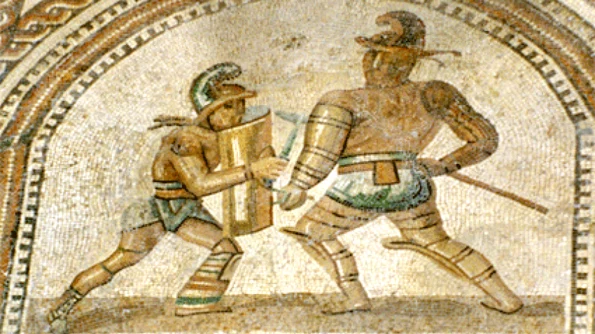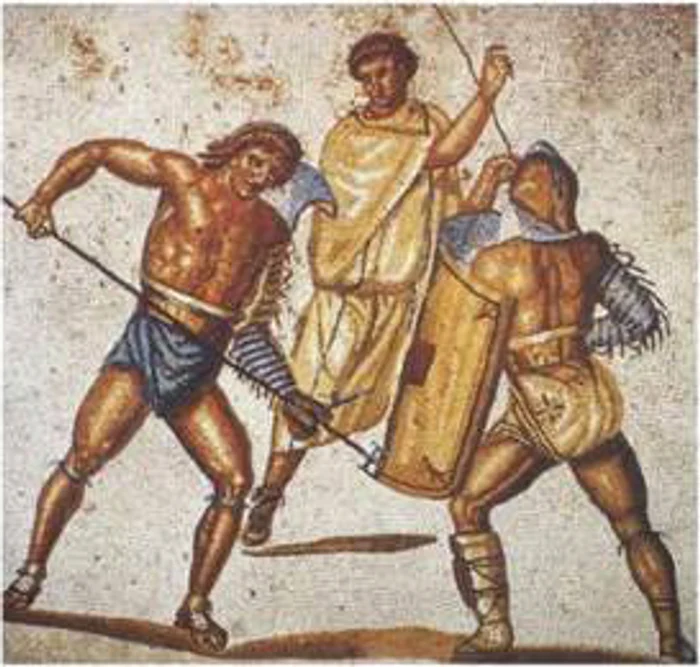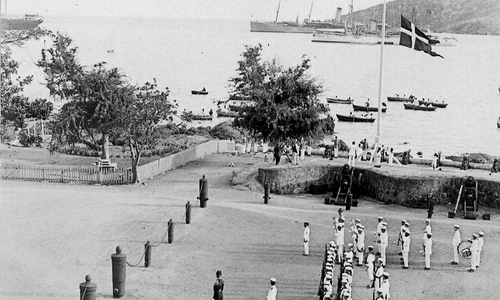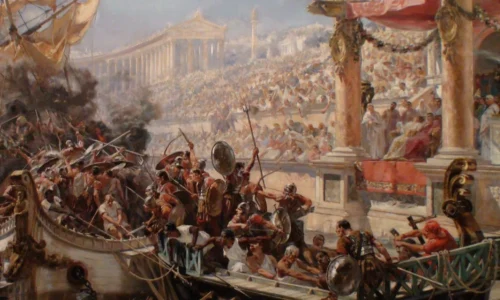
Gladiators, the Cursed Stars of Ancient Rome
Gladiator fights are definitely among the favourite subjects tackled both by professional and amateur historians. All the more that new aspects of this horrific practice come to light. Archaeologist Georges Ville believes that the phenomenon is far worse than we had imagined, explicable through reasons quite different from those that led to other horrors such as the Inquisition, the Holocaust or the gulags. Sadistic behaviour has always been a constant component of humanity, but gladiator combats exploit it in a seemingly original manner.
First of all we should notice that most gladiators were actually volunteers, pretty much like the modern bullfighters. The encounters were not always fought to the death in order to see who was more powerful or wielded the most powerful weapons. This can be deduced from the relatively small number of frescoes that depict gladiators crossing their swords or piercing each other. Rapidly solving the conflict by means of weapons was not the main attraction of the public. In other depictions they do not even engage in combat, but instead one of them looks toward the ground, while the other raises his sword and does not stare at his opponent, but somewhere in the distance. The defeated stands on his feet, he is not wounded, but raises his finger as sign of defeat, because he is aware he cannot handle his enemy. Now he is merely waiting for the public to make the decision.
Gladiators usually made use of really heavy equipment and more than often they would succumb to fatigue or mental breakdown. The supreme moment is represented by the decision of the public. It was less about a fair fight and more about the crowd that had the unique opportunity to manifest its omnipotence when the fate of a human being depends upon it. The looks on the faces of those who could possibly face death were probably the most intriguing ones, the way they still stood fearless, expressing their preservation of honour. In those times, but nowadays as well, gazing upon the convicted or the dead may induce a feeling of uncanny pleasure. We know that from movies, even though we may not state it overtly. In ancient Rome it was the same. The public did not take part in these shows to see people fighting, they came to see people dying. During the reign of emperor Augustus, gladiators used to perish after about ten combats, but during the reign of Marcus Aurelius they did not resist further than three encounters. A pardon was increasingly hard to gain.
Those who financially supported the games, either the wealthy or the emperor, used to buy or rent gladiators and suffered great losses should their acquisitions die in the arena. However, if they did offer a display of corpses to the crowd, they would double their popularity. It was one of the ways to build up a political career. But why did gladiators choose their activity? The amount of fame was similar to that of football players or rock stars nowadays...Apart from volunteers, sometimes braver criminals could also become engaged in the arena. Nearly anyone could choose this path:free men, slaves, aristocrats, even women or transvestites.
Anyway, it was somehow uncommon among the noblemen because the profession was generally considered dishonourable. When a free man desired to become a gladiator, he had to talk to a lanista, the ‘manager’, who rented the fighters to the wealthy people who would organise the shows. The slave had to persuade his master to sell him. Once gladiators, they could be rented or resold to important patrons, who sometimes could gather hordes of such ‘soldiers’ and even use them to intimidate enemies, as pope Damasus does in the year 367 when fighting against an antipope. Gladiators also represented a very profitable means to acquire wealth. Even Cicero would speculate on acquisitions and sales in order to come into a lavish fortune without too much effort, like many other noblemen.

Nonetheless, gladiators represented a highly unstable merchandise, hard to control, since they were after all armed, fearless and more than often very desperate men. As such, the manager needed some kind of judicial support, put into practice by his right to brand his men. Slaves could be treated anyhow, but in what concerns free men, they used to sign a special contract named autocratio, which stated their renunciation of certain privileges. The shows usually commenced with a dramatised set-up. The hot iron was prepared for cowards, a high platform was erected for corpses, the fighters were chosen, and little by little the public was stimulated.
But where does this institution actually stem from? It was initially a custom that many peoples shared. On the death of a dear one, some former servants may have used skirmishes in order to express their profound feelings of despair. Funerals may have occasioned a great variety of hysterical public manifestations, among which these duels as well. Gradually these ceremonial customs are converted into pure show, with a bit of help from the politicians. Because in ancient Rome funerals were also a great opportunity for electioneering, ever since the heirs realised they could speculate on the banquets so as to gain popular support. Feasts and games were also postponed, even with months, so that they could coincide with the hustings. The funerary guise therefore becomes a form of entertainment. Convicts get in the hands of the wealthy, who disguise them in gladiators and sent them to be butchered by the real fighters. Art, ranging from monuments and sculptures in the homes of the rich to clay recipients and oil lamps in the homes of the poor record a lot of memorable scenes from the arena.
To better understand what the public may have felt at this display of blood, Paul Veyne draws a comparison to the attitude of the modern man toward erotic movies. Our feelings regarding pornography are a mixture of attraction and disgust, the same that gladiator games may have triggered. The crimes and corpses satisfied the viewer, but they also caused a lot of horror. But it was more about the preservation of his own body than it was about feeling sympathetic to the dying man. Human sacrifice was perceived as a part of a world still beyond civilisation, a barbaric realm beyond civic values, a reminder of an archaic period. The idea of a crime committed in times of peace horrified, but in the same time the passion for blood spoke otherwise.
Feelings toward gladiators are ambivalent as well. The crowd cherished them as stars, but also despised them for they represented a terrifying human type:assassins, victims, walking dead, impure. Those who condemned this phenomenon are not to be suspected of charity. It is the same situation as with prostitution. One can blame it for being a temptation, or one can consider it a necessary evil. Gladiators themselves were some sort of prostitutes of death. They rejoiced a high degree of admiration, but it was very unwise to seek their company. The prude attitude did not lament their own fate, but the beholders who were faced with such monstrosities, and it was in fact limited to philosophers and Christian thinkers.

If certain thinkers affirm that such shows are cruel, they do so bearing in mind that they may implant cruelty in the beholders, that they offer an example of crime in times of civil peace. The same way we fear that violent movies may cause an increase in delinquency. The Greeks too will adopt the custom, believing that the shows represented a school of courage, an opinion shared by Cicero, whose only problem appears to be the involvement of free men in the shows. The criticism against gladiator games has therefore a very selfish moralistic component. Seneca is also afraid because the crowd witnesses such outbreaks of impurity and cruelty. No one really concerned themselves with gladiators just out of empathy and the few who did were mocked as being womanized.
The end of gladiatorship can be explained less by selfishness and more by the changes in the political climate at the end of antiquity, by the general fear springing from the need for self-preservation. When one sees how regular people, not only criminals or enemies, are sent to death, there arises a sentiment of threat, a return to the jungle law. Gladiatorship was one of the means by which the powerful made use of fear to their own benefit. When the emperors started to convert to Christianity, gladiator games begin to lose their frequency. It was more of an ideological change, since the emperor became the father of his subjects, he had to make sure they feel protected, and not fearful, and so obey the one that protects them. Like a good parent, he guards his children against bloody performances that may offer some pleasure at the beginning but then come back to haunt them. In the first three centuries the emperors were a different kind of shepherd, the one that leaves the herd at the mercy of instincts, guarding it against nothing, merely controlling them.
Further reading:
Georges Ville, La gladiature en Occident, des origines a la mort de Domitien, Ecole francaise de Rome, 1981;
Paul Veyne, Sexe et Pouvoir a Rome, Tallandier, 2005.
















